” data-timestamp-html=”” data-check-event-based-preview data-is-vertical-video-embed=”false” data-network-id data-publish-date=”2024-06-09T21:39:02Z” data-video-section=”world” data-canonical-url=”https://www.cnn.com/videos/world/2024/06/09/macron-dissolves-french-parliament-europe-bell-nr-digvid.cnn” data-branding-key data-video-slug=”macron dissolves french parliament europe bell nr digvid” data-first-publish-slug=”macron dissolves french parliament europe bell nr digvid” data-video-tags data-details data-track-zone=”top” data-sticky-anchor-pos=”bottom”>

Why Macron’s calls for snap election may be a ‘big gamble’
02:03 – Source: CNN
- French President Emmanuel Macron dissolved his country’s parliament and called snap elections after an EU exit poll showed a historic surge for the French far right.
- Exit polls showed gains for far-right parties in Germany and Austria, as three days of voting wrapped Sunday across the EU’s 27 member states.
- But the mainstream center-right European People’s Party (EPP) is predicted to remain the largest political grouping in Brussels, as its lead candidate said “the center is holding.”
- The vote, one of the world’s largest democratic exercises, comes at a pivotal moment for the EU, which is grappling with issues ranging from the wars in Ukraine and Gaza to immigration and climate change.
Our live coverage of the European elections has ended. Read the latest developments here.
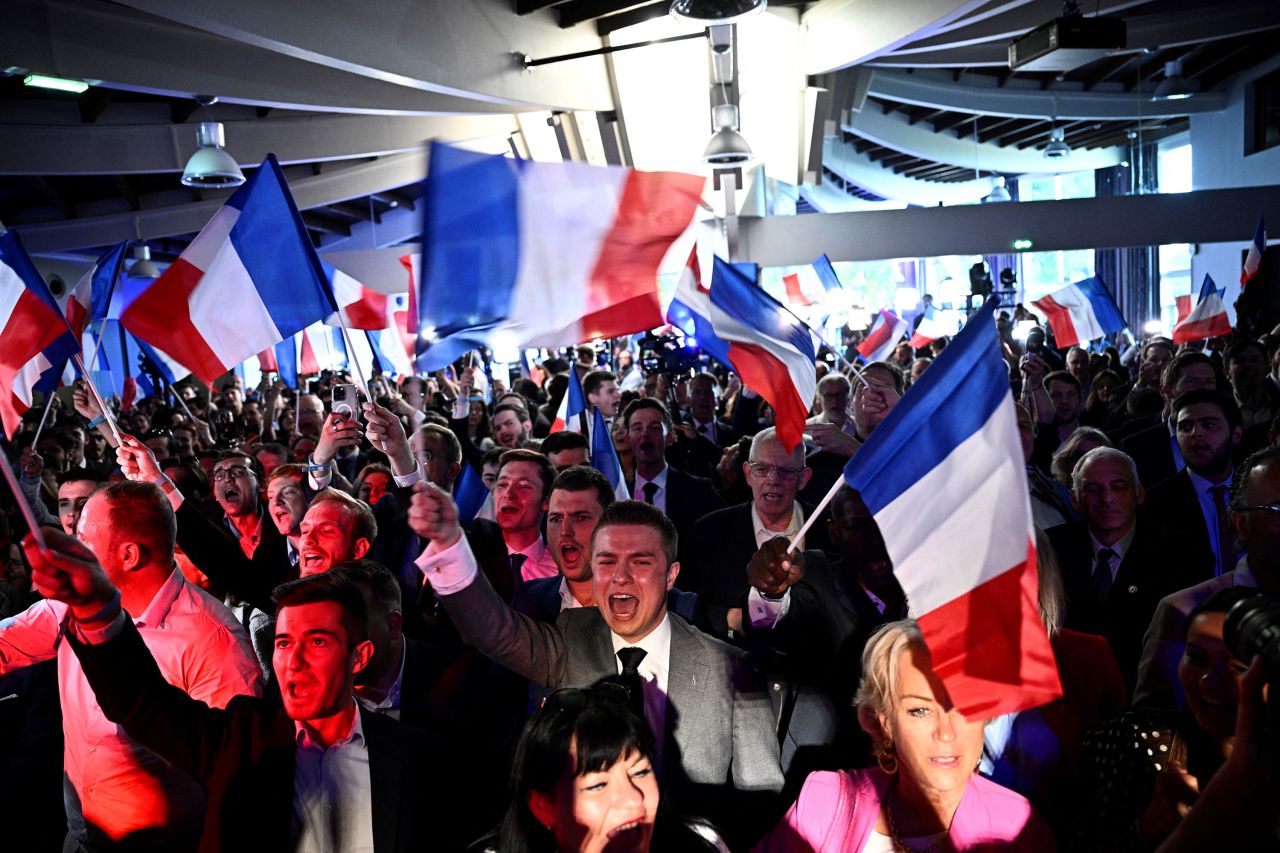
Supporters of France’s National Rally (RN) celebrate at an election night event in Paris on June 9.
Europe’s drift to the right has been a long journey that’s seen the continent’s mainstream increasingly accommodate people with Euroskeptic views that were once fringe.
The projected gains for the hard right in the European parliamentary elections may seem modest in terms of pure numbers, but they are significant.
The results represent a major challenge to the pro-Europe mainstream officials who dominate the institutions of the European Union.
The advances chalked up by far-right parties may not be unexpected, and they don’t pose an existential crisis for the EU. But they show how the Euroskeptic right could, in the coming years, tighten its grip on the direction of the union.
Over the next 24 hours, the parties of the center – projected to remain the largest bloc in the European Parliament – will likely talk of a “grand coalition” to counter the rise of the far right. And while the far right is on course to make large gains, the center parties remain ahead.
On paper, these pro-EU parties can claim victory. On numbers alone, the centrist coalition has held. The center-right European People’s Party, the center-left Socialists and Democrats, and the liberal Renew Europe are the three largest groups in the European Parliament. When you throw the pro-Europe Greens into that, the center is by far the largest block.
Read the full analysis here.
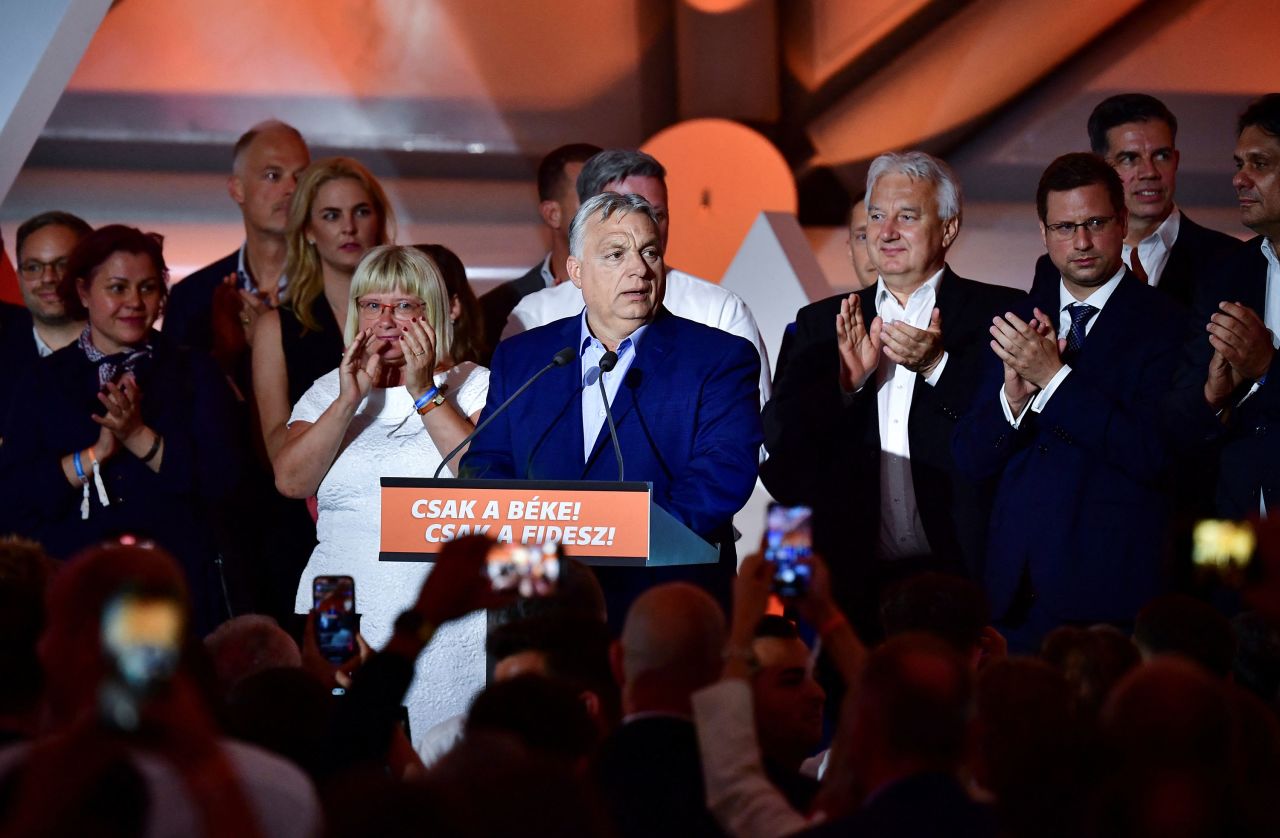
Hungarian Prime Minister Viktor Orban speaks after the announcement of the partial results of the European Parliament and municipal elections in Budapest, Hungary, on June 10, local time.
Hungarian Prime Minister Viktor Orban’s Fidesz party, in coalition with the country’s Christian Democratic People’s Party (KDNP), has come out on top with 43.7% of the vote, according to an exit poll.
However, this is a roughly 10% drop in support since 2019. In second place, the Tisza party, led by political newcomer Peter Magyar, gained 30.7%.
It’s important to note that Orban’s party is politically homeless in Brussels after Italy’s Giorgia Meloni resisted the authoritarian leader’s request to join the right-wing European Conservatives and Reformists Group (ECR).
Since Russia invaded Ukraine, Orban has been criticized for obstructing the EU’s attempts to send aid to Kyiv.
In 2019, his party was also suspended by the center-right European People’s Party (EPP) amid controversy over democracy and the rule of law in his country.
Giorgia Meloni’s right-wing Brothers of Italy party has a clear lead ahead of the country’s Democratic Party (PD) with 28% of the vote, according to an exit poll.
In second place, PD has 23% of the vote, roughly the same share of the votes that the party gained in 2019. The Five Star Movement came third with 12%.
In the 2022 Italian election, Meloni – who is the current chair of the right-wing European Conservatives and Reformists Group (ECR) – was vocal in her opposition to LGBTQ+ rights and desires to tackle immigration.
She has since been seen as considerably more moderate, backing many EU initiatives including support for Ukraine.
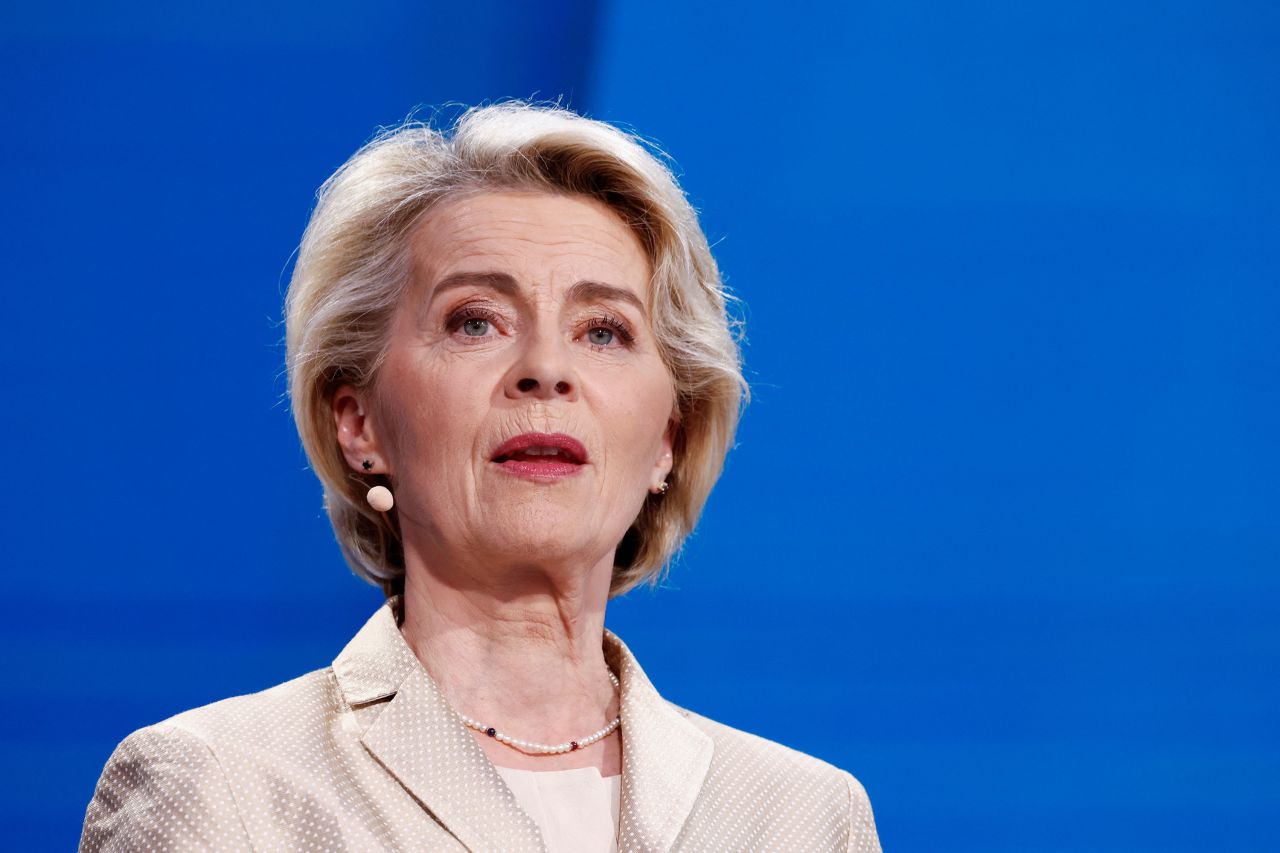
European Commission President Ursula Von der Leyen speaks at the European Parliament building in Brussels on June 9.
Despite a surge of support for far-right parties, European Commission President Ursula Von der Leyen said the final exit poll remained a success for the continent’s political mainstream.
Von der Leyen’s European People’s Party (EPP) is predicted to remain the largest political grouping in the European Parliament with 189 seats.
Roberta Metsola, president of the European parliament, also said the exit poll shows that “the constructive, pro-European center has held.”
European People’s Party: 189
Socialists and Democrats: 135
Renew Europe: 80
European Conservatives and Reformists: 72
Identity and Democracy: 58
Greens: 52
The Left: 36
Non-Inscrits: 46
Others: 52

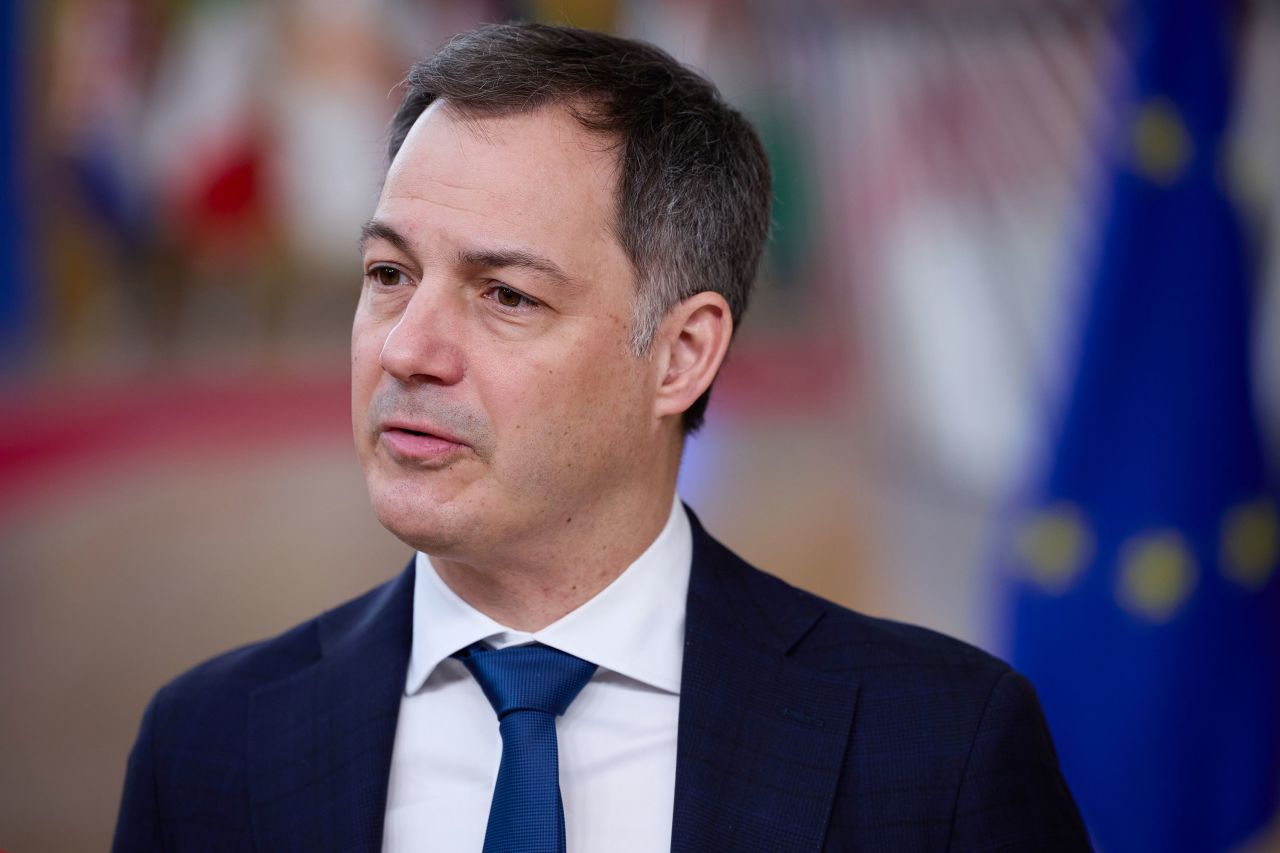
Belgium’s Prime Minister Alexander De Croo arrives for a summit of European Union leaders in Brussels on February 1.
Belgium’s Prime Minister Alexander De Croo has resigned after his party suffered a disastrous defeat in national and European parliamentary elections on Sunday.
The 48-year-old struggled to hold back tears when announcing the decision on Sunday evening in Brussels.
As far as the European Parliament is concerned, De Croo’s Open VLD party also performed poorly, only gaining 5.8% of the vote, according to RTBF polling. The far-right Vlaams Belang party and Flemish nationalist N-VA party were neck and neck, with 14.8% and 14.2% of the vote share respectively, according to the RTBF poll.
In his resignation speech, De Croo promised to allow for a “proper transfer” of power to his successor, stressing that he remains convinced that Belgium “needs a new government with full powers that can take on its tasks.”
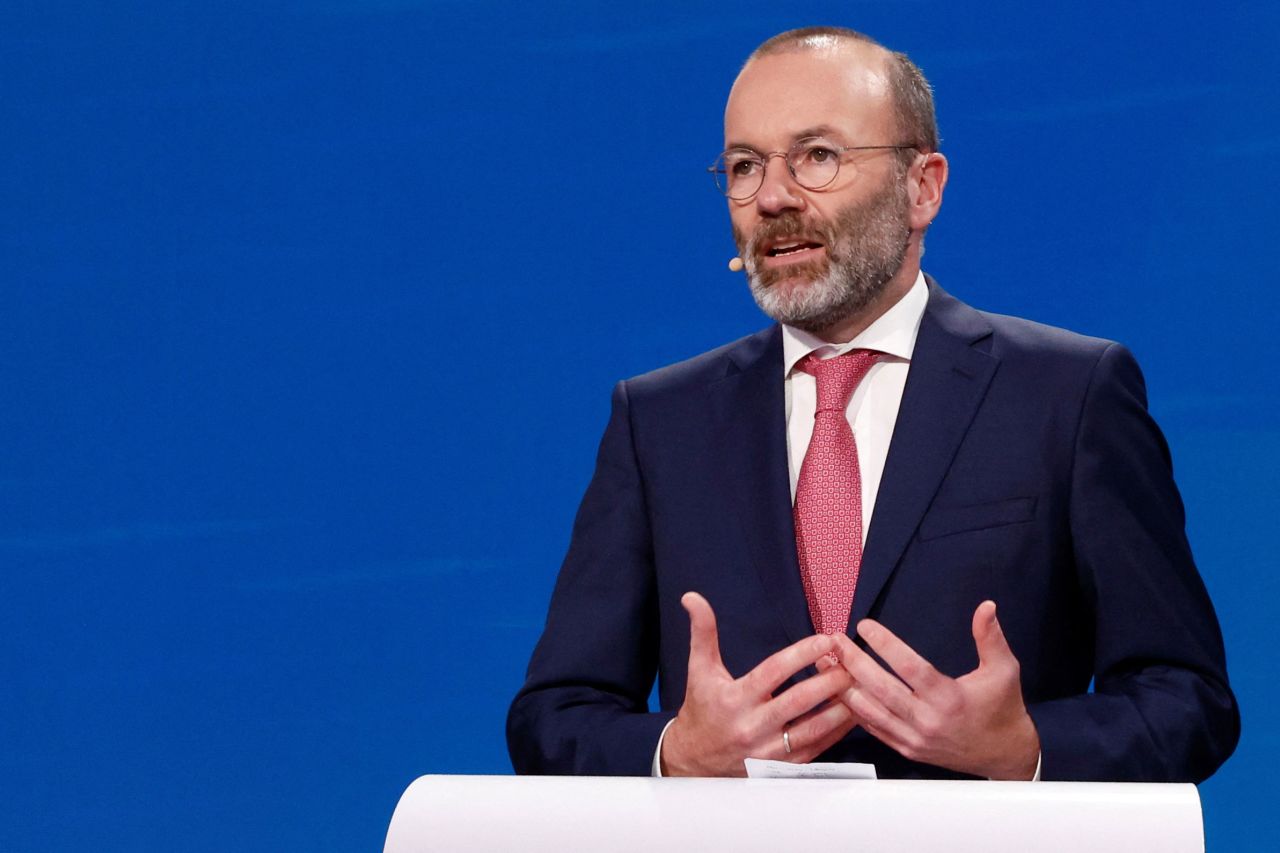
Manfred Weber, chair of the European People’s Party (EPP), speaks at the European Parliament building in Brussels on June 9.
Manfred Weber, chair of the European People’s Party (EPP), said his grouping will aim to shut far-right parties out of any governing coalition.
Speaking after the EPP was predicted to remain the largest grouping in Brussels, Weber urged more mainstream parties to join the EPP’s “pro-European, pro-democratic alliance.”
“The European People’s Party is among the founding fathers and mothers of today’s European Union,” Weber said.
The EPP counts 13 heads of state and government among its members, including Greek Prime Minister Kyriakos Mitsotakis, Swedish Prime Minister Ulf Kristersson, Austrian Chancellor Karl Nehammer and Polish Prime Minister Donald Tusk.
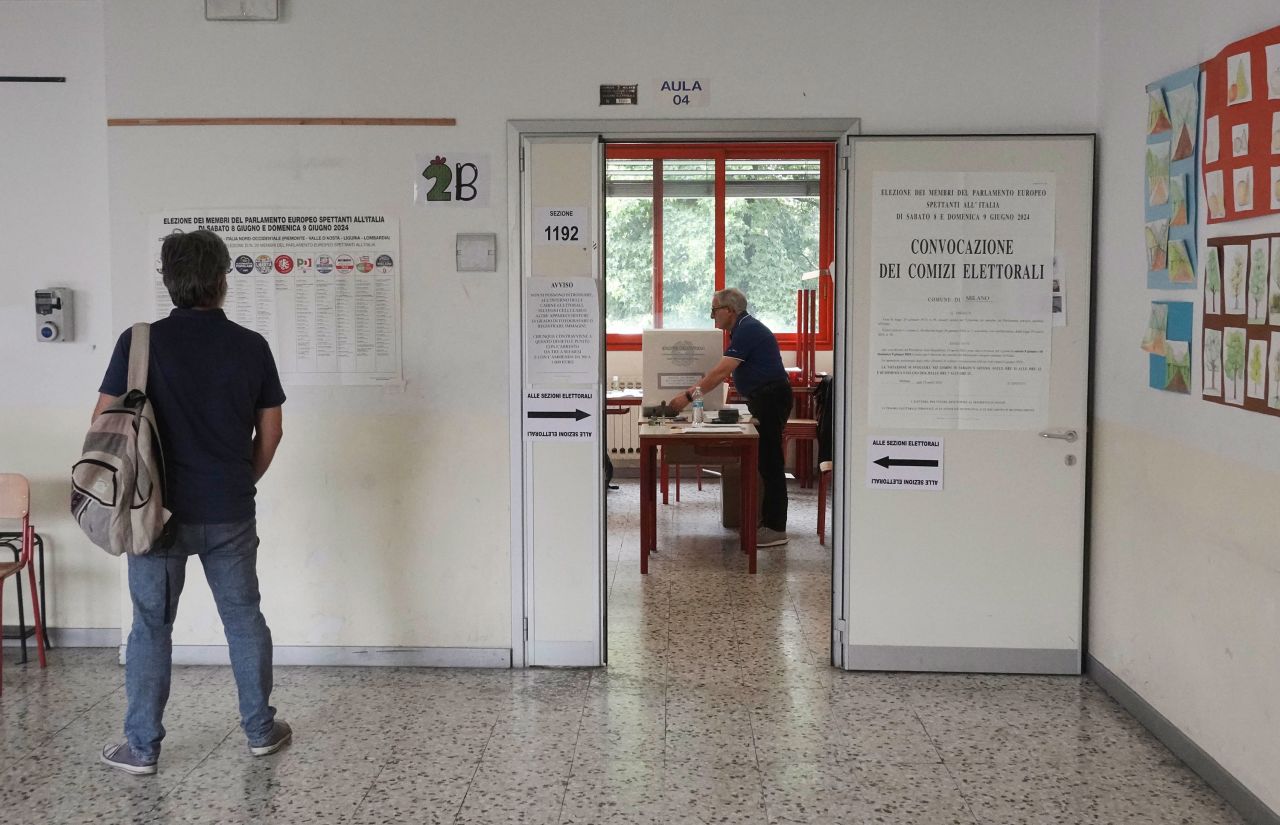
A man checks an electoral board before entering a polling station in Milan on June 9.
Voting across the European Union’s 27 member states has now closed.
The final votes were cast in Italy at 11 p.m. local time, bringing to an end three days of voting across the continent.
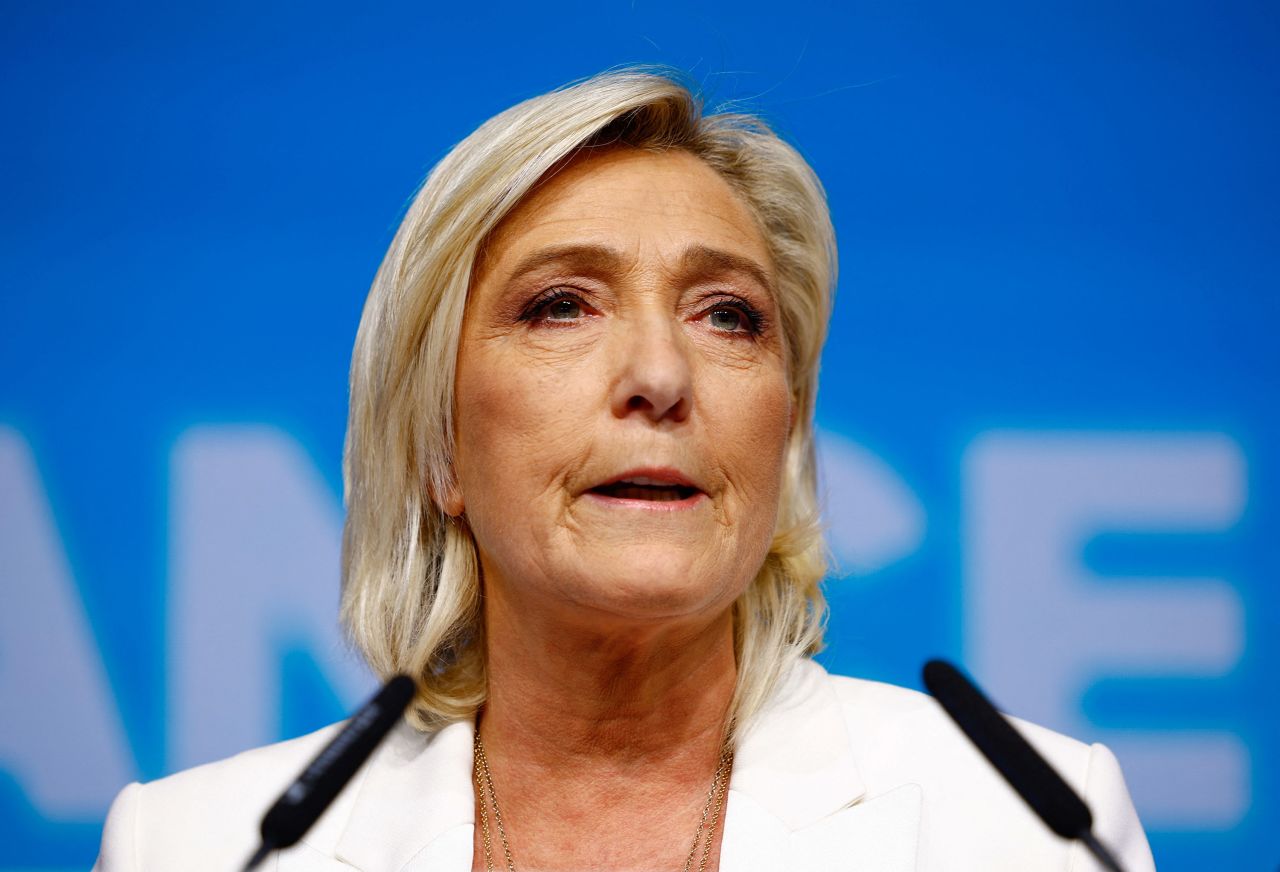
Marine Le Pen, leader of the French far-right National Rally party, addresses party members in Paris on June 9.
France’s far right is poised and “ready to take power,” the movement’s leader Marine Le Pen warned Sunday after French President Emmanuel Macron called a snap parliamentary election.
Speaking after Macron’s shock announcement, Le Pen who ran unsuccessfully for the French presidency in 2022, said she could “not but welcome” the move to dissolve the parliament.
The head of the center-right party Les Republicains, Eric Ciotti, also welcomed the news, calling it the “only solution” after the results of the European elections, according to CNN affiliate BFMTV.
Portugal’s center-left Socialist Party (PS) is on course for a marginal victory, positioned less than 1% ahead of the center-right Democratic Alliance (AD), according to an exit poll from the European Parliament.
The exit poll shows that PS gained 31.4% of the vote, closely followed by AD with 30.6%. The two parties were significantly more popular than other parties, with the Liberal Initiative (IL) in third place with 9.8%.
AD won a narrow victory in Portugal’s snap elections in March, beating PS who had been in power since late 2015.
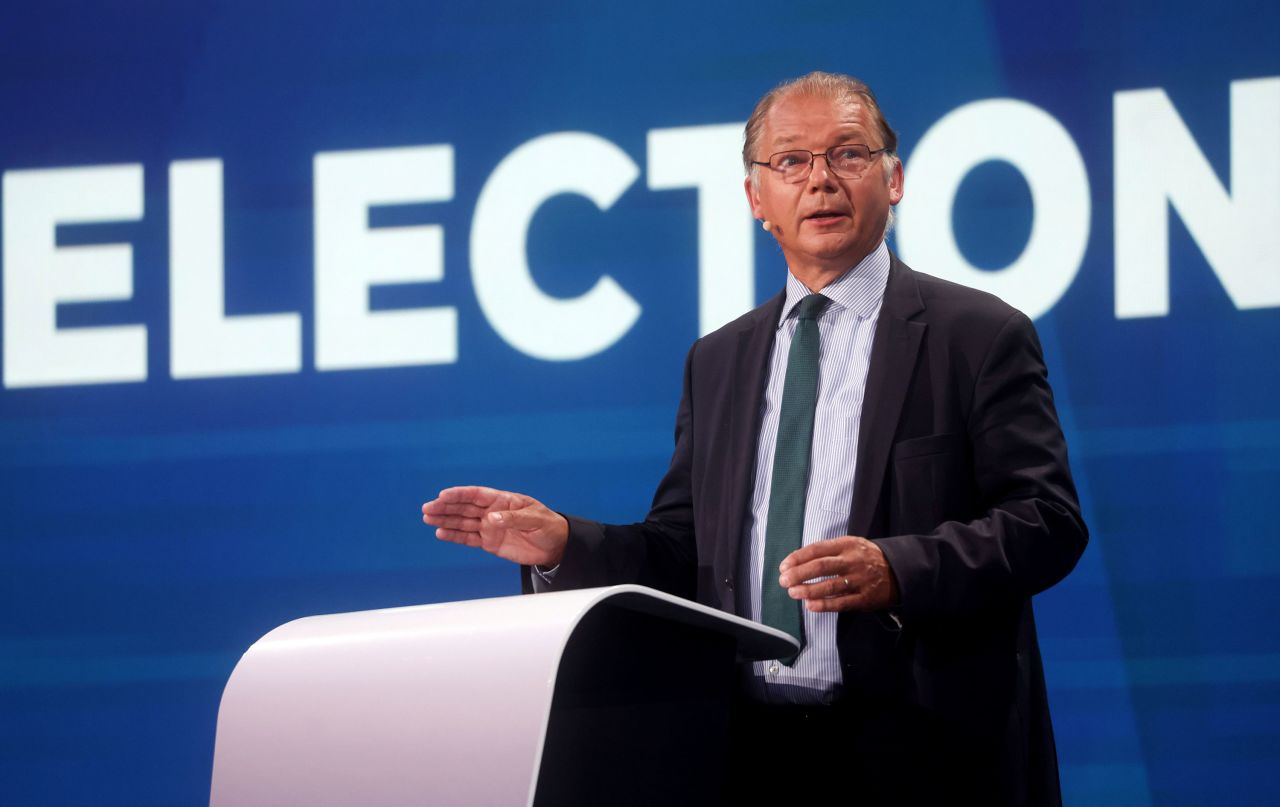
Philippe Lamberts, a member of the Greens/EFA grouping, speaks on stage during an election event at the European Parliament in Brussels on June 9.
Philippe Lamberts, a member of the Greens/EFA grouping, admitted that the exit poll was “not a victory” for their movement.
The grouping is predicted to secure 53 seats, down from 74 in 2019.
“Tonight’s result is certainly not a victory for the Greens,” Lamberts said. “But you see, respecting the boundaries our planet is setting for us is no hobbyhorse of ours. It is an imperative, if we want humans to strive on earth. It is imperative if we want to give a future to all – and we have lost too much time already.”
He said that, without the Greens in the most recent governing coalition, Europe’s green new deal had “gone missing.” He warned the more mainstream parties against “embracing the various flavors of the far right” when forming the next coalition.
Representatives from the political groupings in the European parliament have been making short speeches in Brussels, responding to the earlier exit poll.
Assita Kanko, vice-president of the right-wing European Conservatives and Reformists (ECR), said the strong showings for far-right parties was a symptom of the neglect of voters.
She said the ECR, which is predicted to win 71 seats, hopes to become part of the governing majority in Brussels, when coalitions form in the weeks ahead.
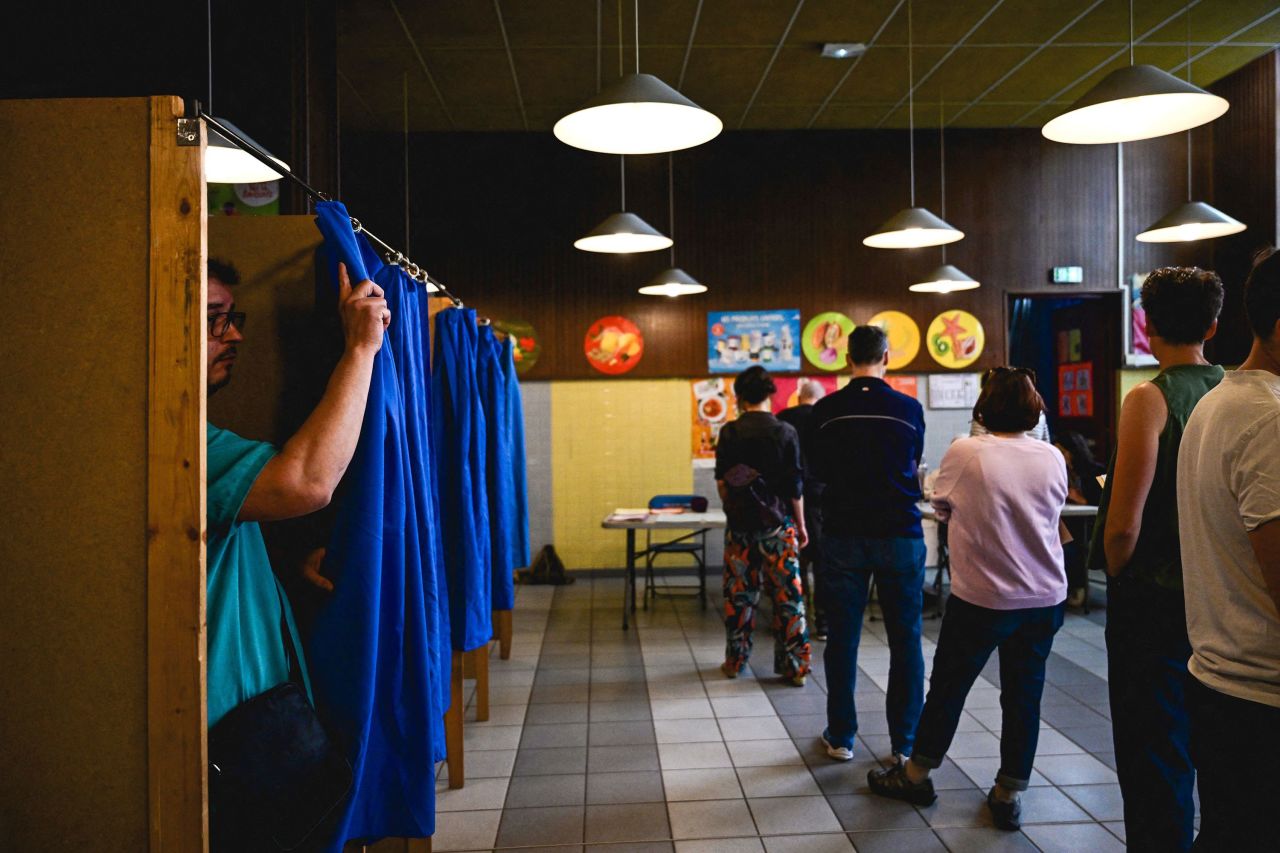
People vote for the European Parliament elections at a polling station in Lyon, France, on June 9.
Turnout in the European parliament elections has been estimated at 51%.
If confirmed, this would be the highest turnout since 1994.
The prediction is slightly higher than the 50.66% turnout in 2019.
The first exit poll shows Spain’s conservative Popular Party (PP) has overtaken the Socialist Workers Party (PSOE) with 33.2% of the vote.
If the projection stands, this will be a substantial increase from the 2019 European elections, when the party held 20.35% of the vote.
Spain’s far-right Vox party came third with 10.4% of the vote, nearly double what the party gained in 2019.
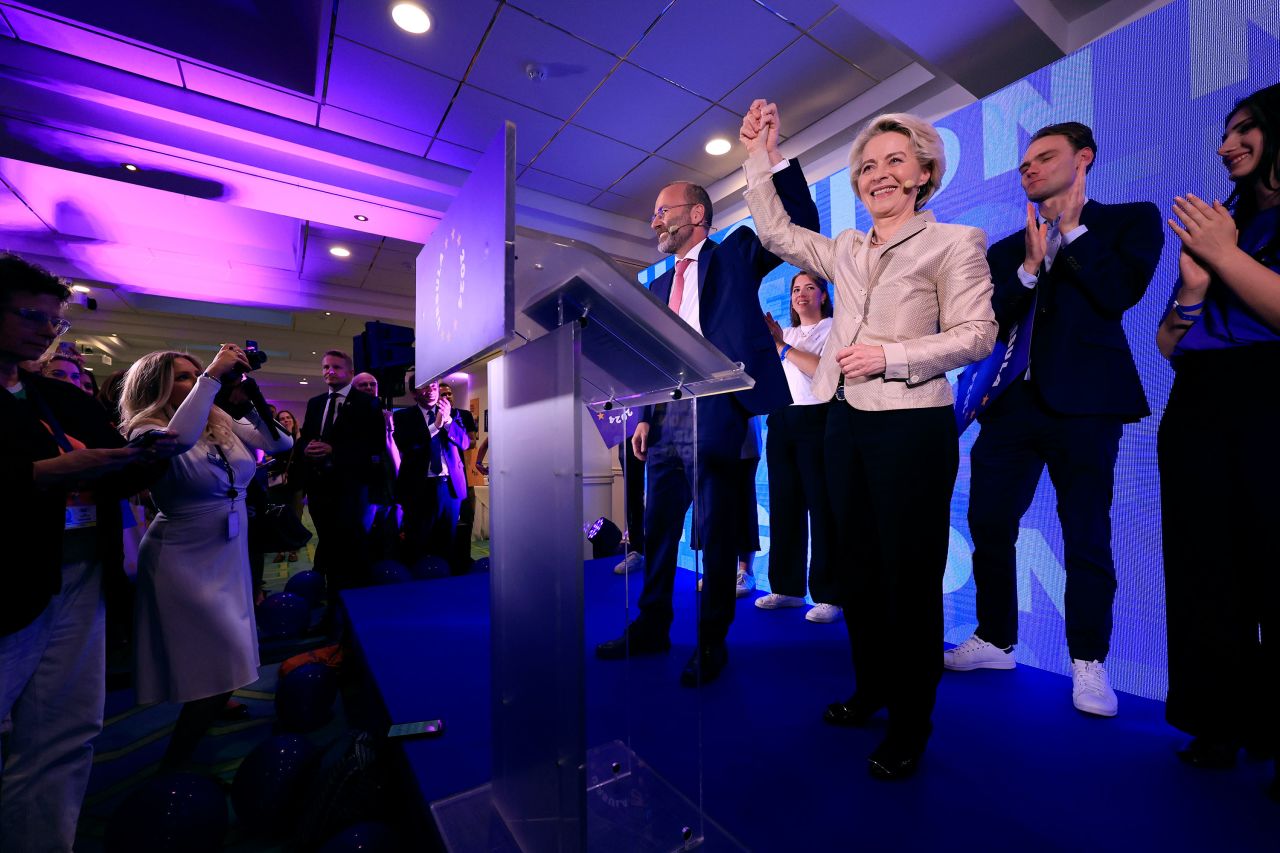
Ursula von der Leyen, President of the European Commission and the lead candidate of the European People’s Party (EPP), poses with party president Manfred Weber during an event in Brussels on June 9.
Ursula von der Leyen, President of the European Commission and the lead candidate of the European People’s Party (EPP), said the grouping will guard against extremes in Brussels.
Speaking after the release of an exit poll which predicted the EPP will remain the largest grouping in Brussels, Von der Leyen said the EPP will deliver a “Europe that delivers, a strong Europe.”
With a predicted 181 seats, Von der Leyen said “no majority can be formed without the EPP.”
If confirmed, the prediction means the EPP would have lost just six seats since the last election in 2019, despite strong predicted gains for far-right parties.
Manfred Weber, President of the EPP, shared his support for Von der Leyen.
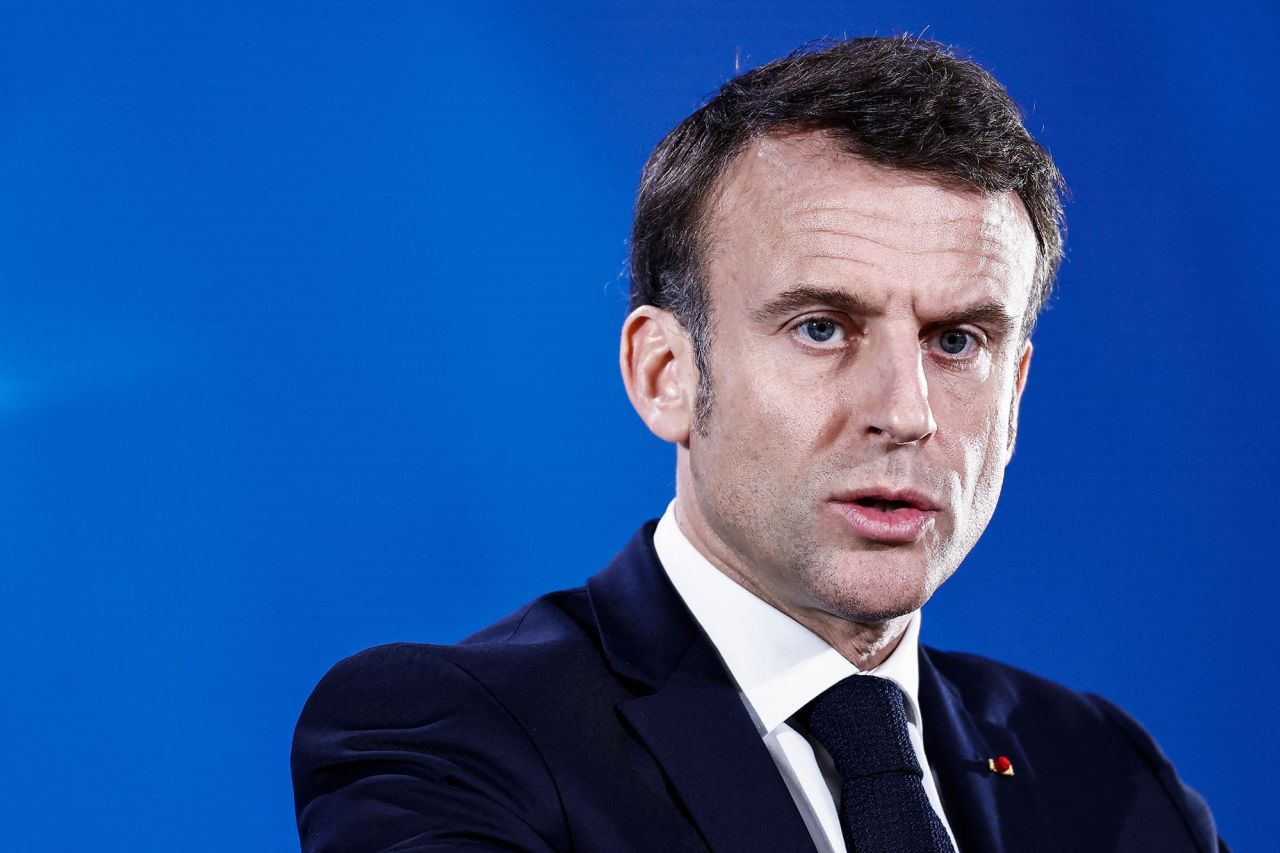
French President Emmanuel Macron speaks during a press conference in Brussels on March 22.
France’s President Emmanuel Macron has dissolved the country’s parliament, the National Assembly, and called a snap election after an exit poll showed his Renaissance party is set to be trounced by the far-right opposition in European parliamentary elections on Sunday.
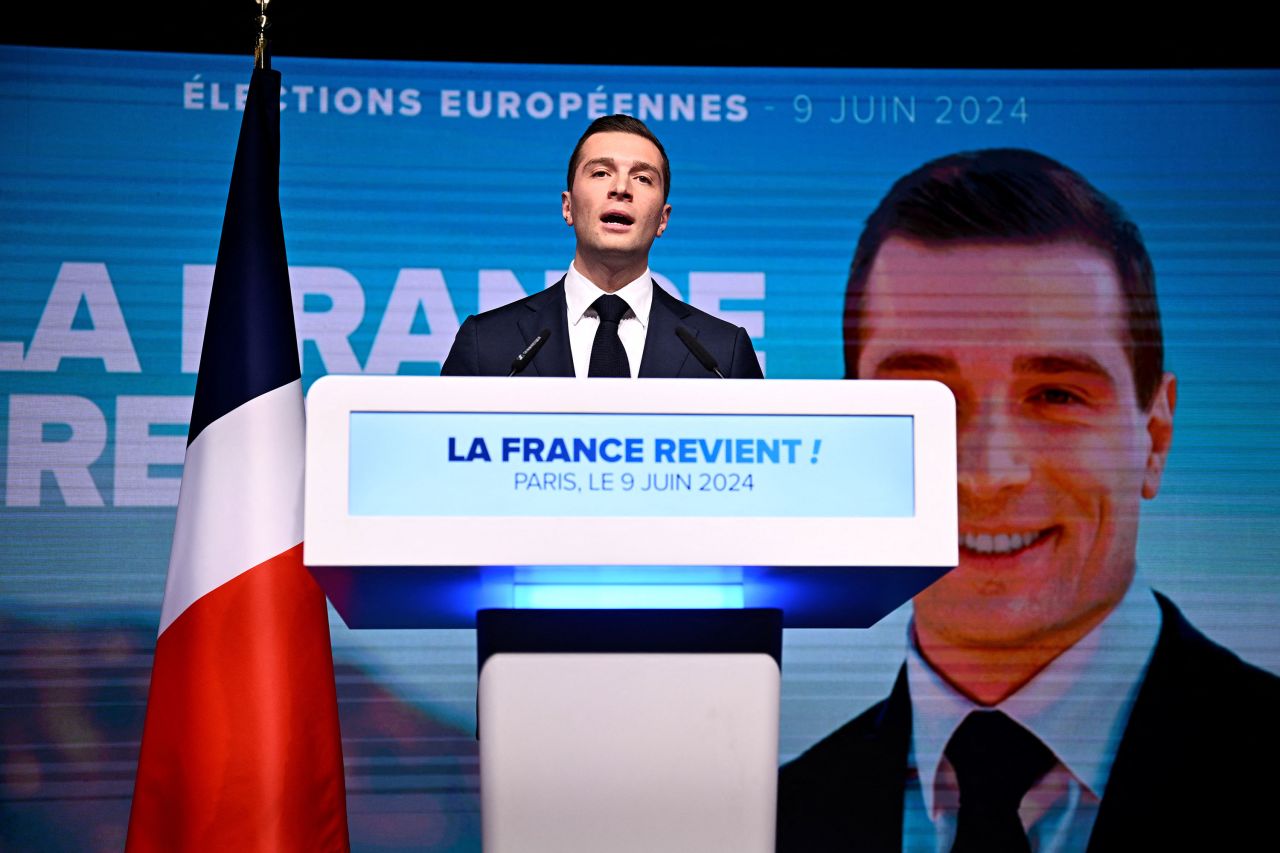
Jordan Bardella, the leader of France’s National Rally (RN) party, addresses supporters at the Pavillon Chesnaie du Roy in Paris on June 9.
Jordan Bardella, the leader of France’s National Rally (RN) party, called on President Emmanuel Macron to dissolve the French parliament after a strong showing for the far-right in European elections.
Bardella said the gap between his party and Macron’s Renaissance party is a “stinging disavowal” for the French president.
“The president cannot remain deaf to the message sent out tonight by the French people,” Bardella remarked, calling on Macron to “take note” of the results and dissolve France’s lower house, the National Assembly.
Bardella’s call was echoed by leading figure of the French far-right Marine Le Pen, who said Sunday’s result showed ” a very clear message” from the French people to Macron.
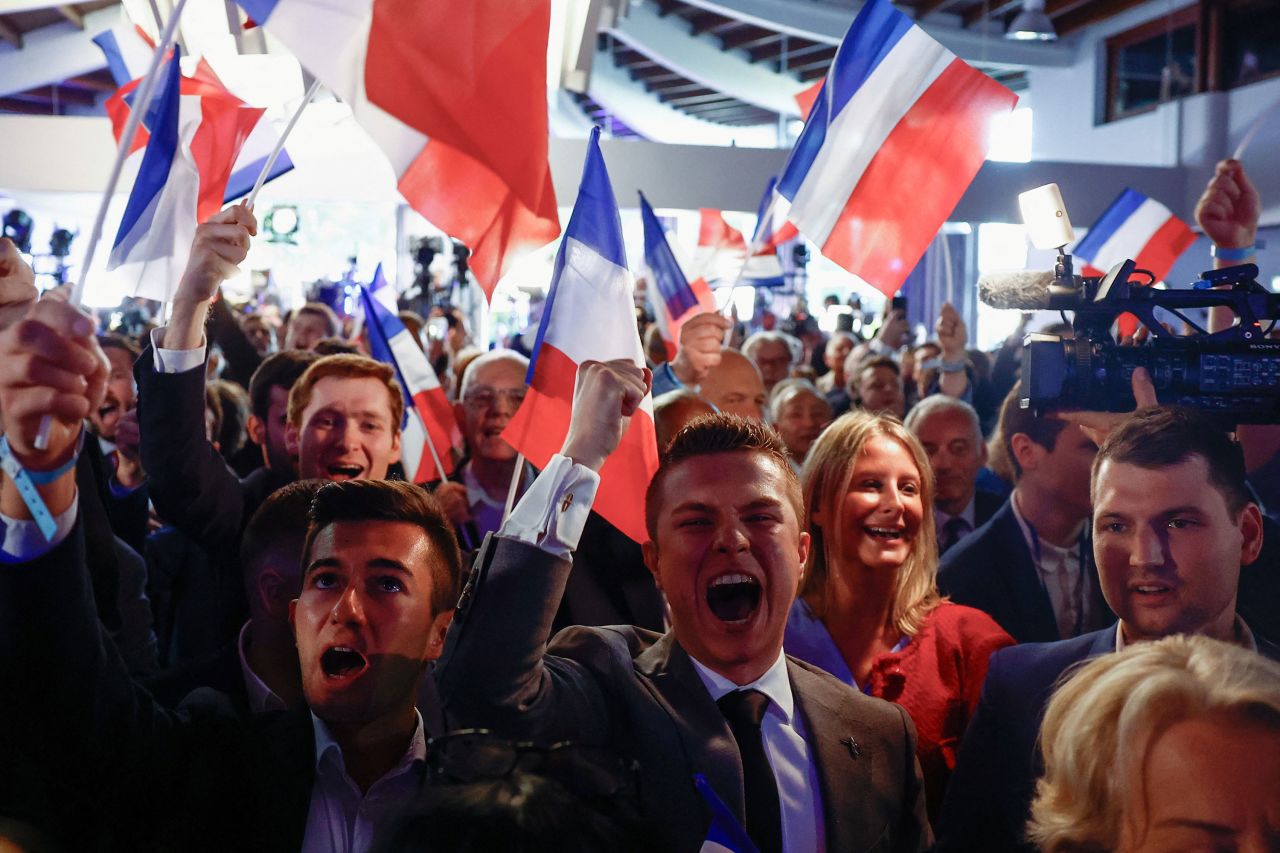
Supporters of the French far-right National Rally party react in Paris after the polls closed during the European Parliament elections on June 9.
Exit polls in France show the far-right National Rally (RN) party has come out on top with 31.5% of the vote, more than double the share of French President Emmanuel Macron’s Renaissance party.
Renaissance, led by Valerie Hayer, scraped into second place with 15.2% of the votes, just ahead of the Socialists in third with 14.3%.
Turnout was at a record high of 45.3%, according to the French Interior Ministry – 2 percentage points higher than the previous European elections held in 2019.
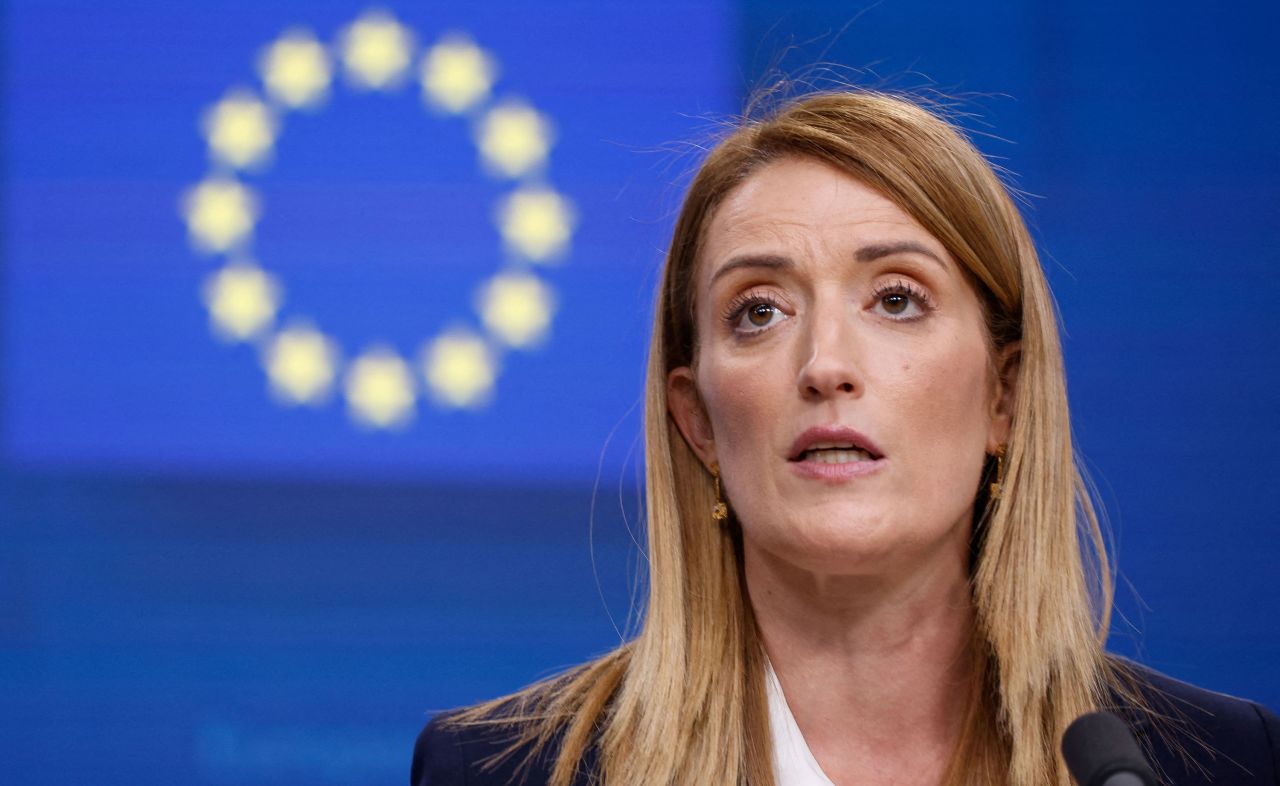
European Parliament President Roberta Metsola speaks at a press conference in Brussels on October 26.
The President of the European Parliament, Roberta Metsola is set to re-gain her seat in the parliament after receiving the highest number of first preference votes in her home country of Malta, according to Maltese public broadcaster, PBS.
Metsola’s Nationalist Party is set to receive three of the six available seats in the European Parliament, according to an exit poll for Malta published by the European Parliament on Sunday.
Her party is part of the European People’s Party group which is the parliament’s center-right political group.
Metsola was appointed to the role of European Parliament President in January 2022 after her predecessor, Italian politician David Sassoli died unexpectedly mid-term.
Her appointment sparked controversy as members of opposing political groups criticized her strong opposition to abortion, among other issues.
A first estimate for the European Parliament, based on 11 members states’ estimates and 16 pre-election polls on voting intentions, has been published.
European People’s Party: 181
Socialists and Democrats: 135
Renew Europe: 82
European Conservatives and Reformists: 71
Identity and Democracy: 62
Greens: 53
The Left: 34
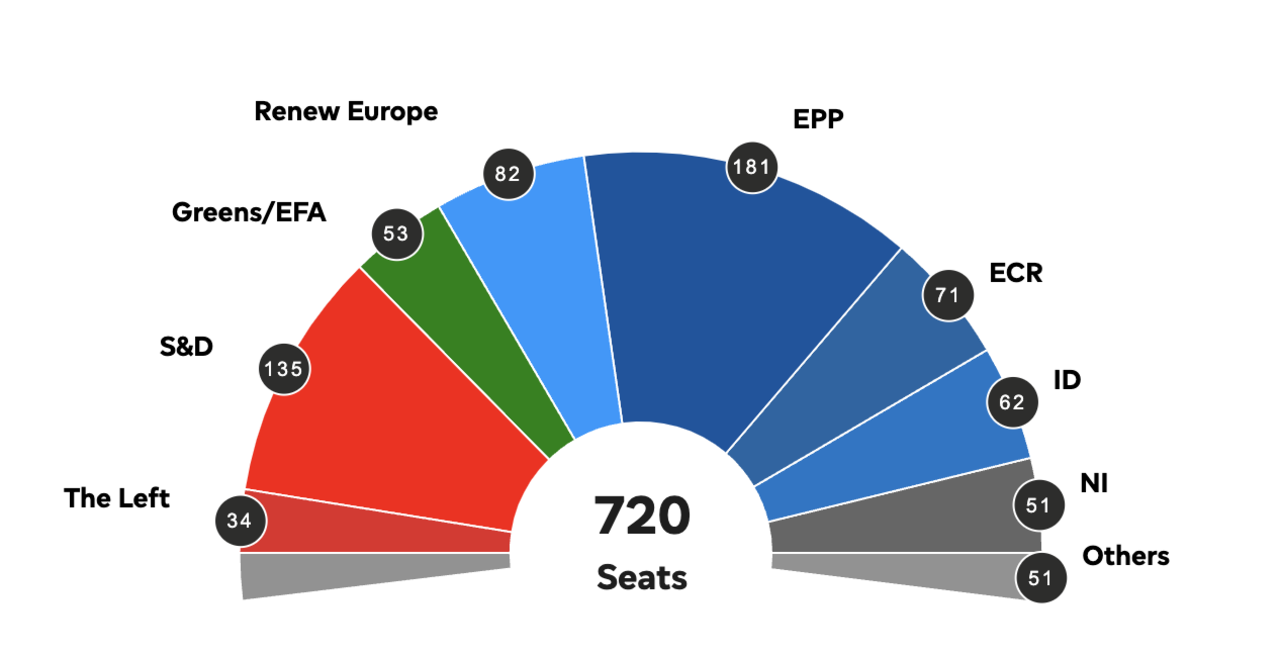
Party officials at the Alternative for Deutschland (AfD) headquarters began to cheer as an exit poll showed the party on 16% of Germany’s vote.
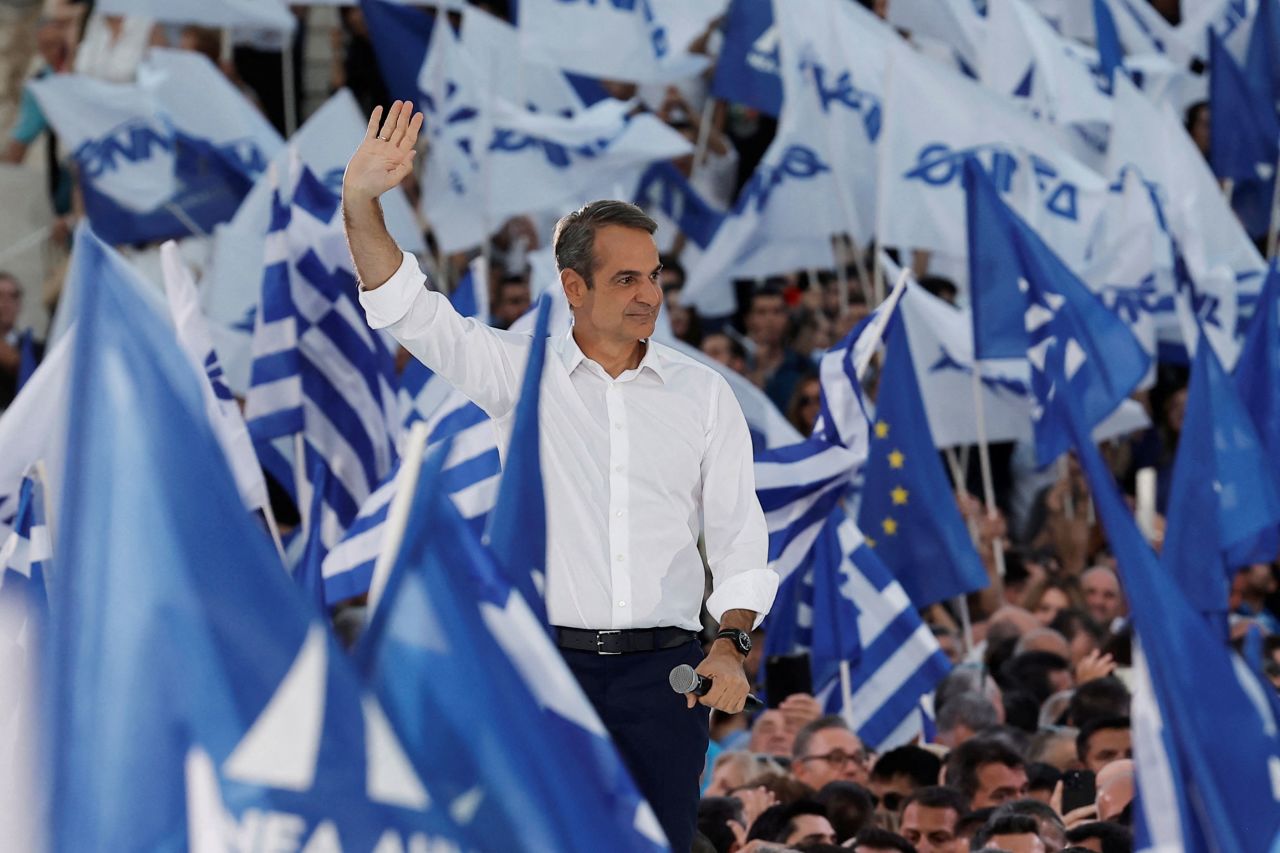
Greek Prime Minister and leader of the New Democracy ruling party Kyriakos Mitsotakis waves at supporters during a pre-election rally in Athens, Greece, on June 7.
The first exit poll shows Greece’s ruling party, New Democracy, is predicted to come first with around 30% of the vote.
If the prediction holds, that would be almost double the number of votes of the left-wing opposition Syriza party, which secured around 16% of the vote.
The centre-left Pasok party is in third, with around 12% of the vote.
New Democracy is led by Greek Prime Minister Kyriakos Mitsotakis and is part of the center-right European People’s Party (EPP), currently the largest grouping in Brussels.
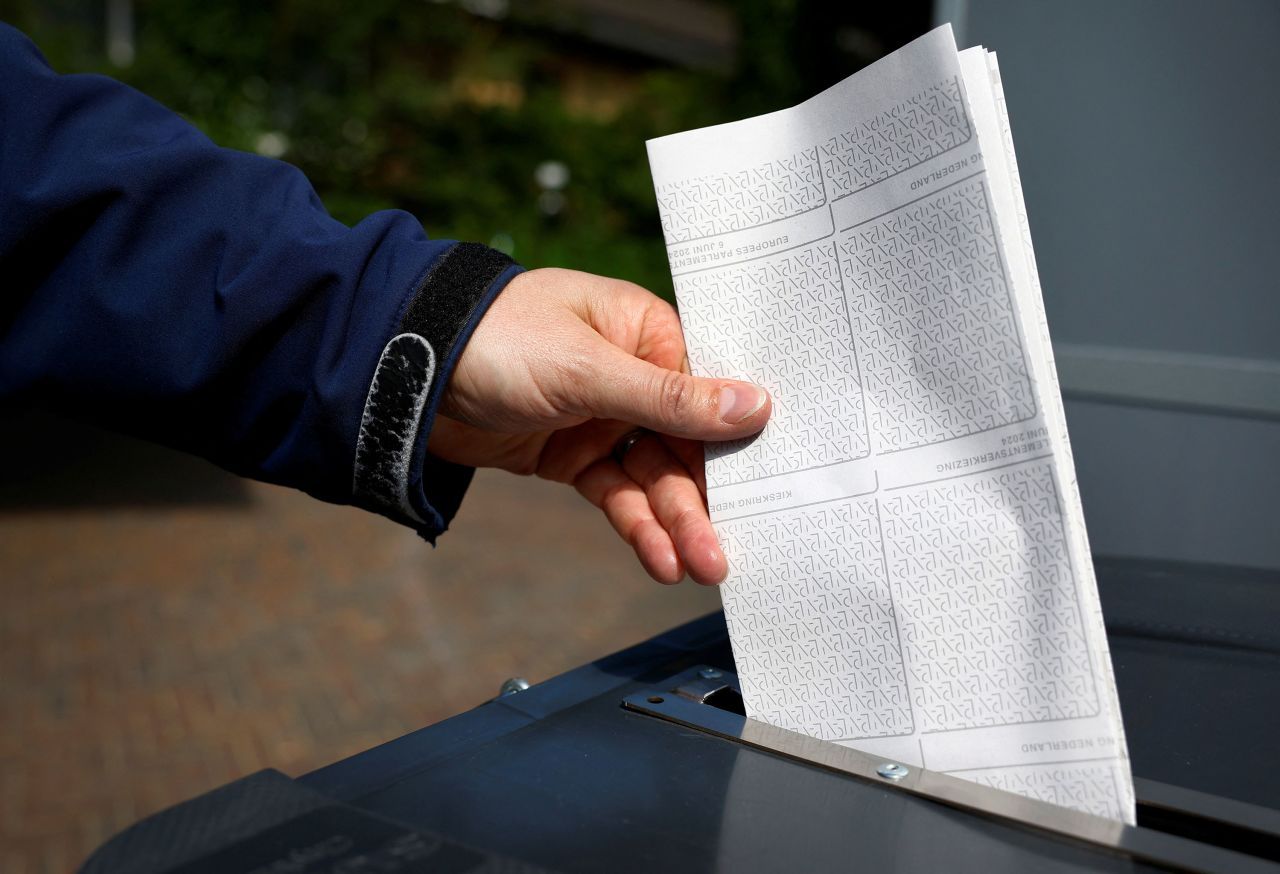
A person votes in the European Parliament elections in Arnhem, Netherlands, on June 6.
In the Netherlands, the far-right Party for Freedom (PVV) – headed by the divisive firebrand Geert Wilders – gained 17.7% of votes, according to an exit poll.
Wilders has drawn attention for his anti-Islam stance and anti-immigrant populist policy plans, including ambitions to create the Netherland’s strictest ever admission criteria for asylum seekers.
The party is predicted to take up to seven of the Netherland’s 31 seats in the European Parliament.
The Dutch prime minister, Mark Rutte’s party, the People’s Party for Freedom and Democracy (VVD) placed third in Dutch exit polls, receiving 11.6% of votes which equates to 4 seats.
After initial predictions, the far-right Freedom Party (FPÖ) is comfortably in first place in Austria’s European Parliament elections.
In an exit poll, FPÖ was predicted to gain 27% of the vote, ahead of the second-placed conservative People’s Party (ÖVP), with 23.5%, and the Social Democrats (SPÖ) in third with 23%.
FPÖ were among the founding members of the far-right Identity and Democracy (ID) grouping in Brussels.
The prediction showed a sharp fall in support for the governing ÖVP, which won 34.5% at the last European elections in 2019.
Austria has only 20 seats in the European Parliament, but the vote could anticipate another strong showing for the FPÖ in Austria’s parliamentary elections, to be held later this year.
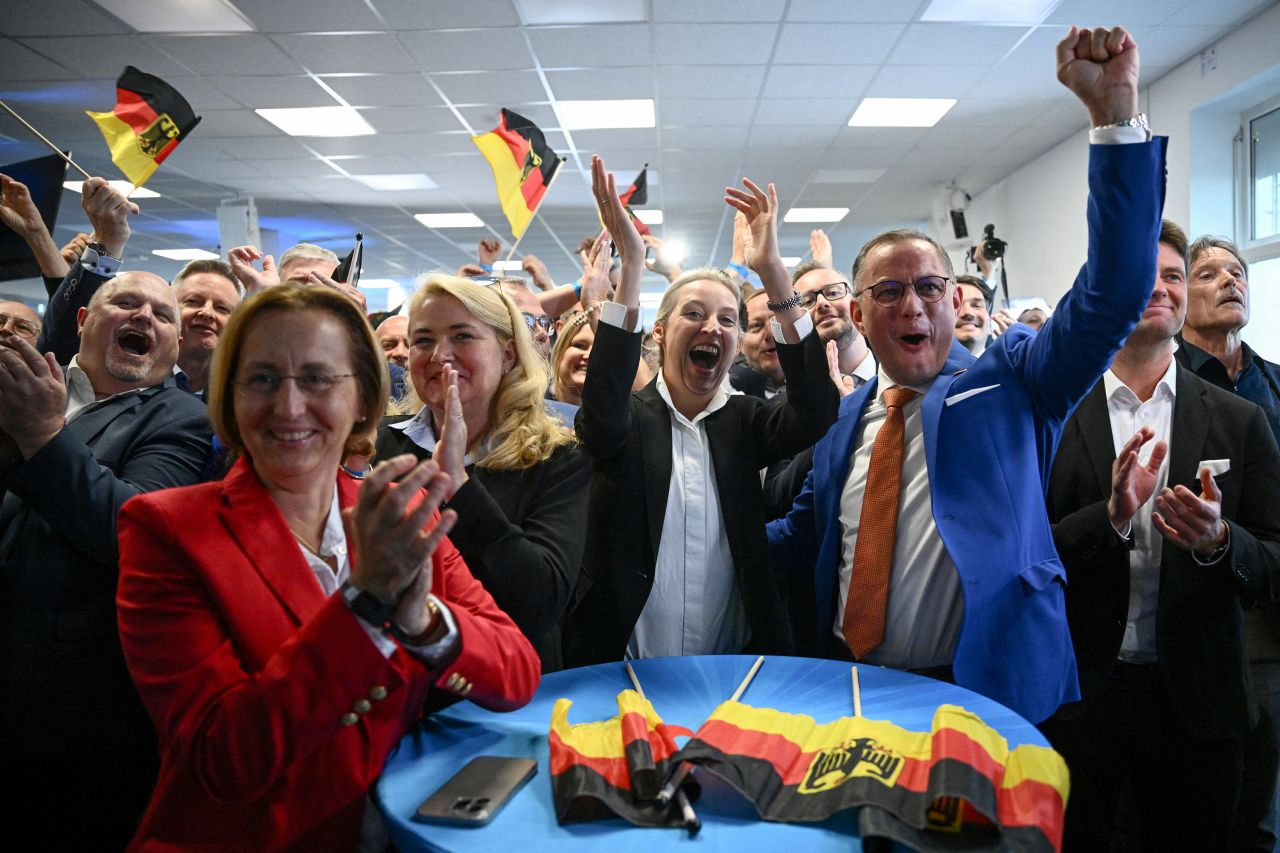
Alternative for Germany (AfD) party co-leaders Alice Weidel, center, and Tino Chrupalla, right, react to results after the polls closed in the European Parliament elections in Berlin on June 9.
The far-right Alternative for Germany (AfD) party is set to come second in Germany’s European Parliament elections, according to an exit poll from the European Parliament.
After initial predictions, the AfD had gained 16.5% of the vote, 5 percentage points higher than in the last vote in 2019.
The center-right Christian Democrats Party (CDU) is predicted to win 29.5% of the votes, making it the strongest party. The CDU is the political party of the incumbent European Commission President Ursula von der Leyen, who is hoping to gain a second term.
The exit poll indicates a weak showing from German Chancellor Olaf Scholz’s center-left Social Democratic Party (SPD), which finished third with 14%.
Some background: Despite a strong predicted showing from the AfD, it is politically homeless in Brussels, after being kicked out of the far-right Identity and Democracy (ID) party.
ID removed the AfD from the group after its main European candidate, Maximilian Krah, said he did not consider all members of the Nazi group the SS to be criminals. ID said they no longer wanted to be associated with the party following Krah’s comments.

Ukrainian soldiers defend the frontline in Vovchansk, Ukraine, on May 20.
In the immediate-term, it’s very unlikely that the EU’s position of supporting Ukraine through military assistance and financial aid will change.
The EU has been accused of moving slowly on Ukraine at various points since the start of the war, but it is fair to say that Brussels has taken moves on foreign policy – and specifically against Russia, an important economic partner and source of energy for many European countries – that would previously have been unimaginable.
The bloc moved swiftly to sanction Moscow, stemming the flow of European goods to Russia and gradually to stop purchasing its gas. Over the past 27 months of war, many EU nations have sent Ukraine ammunition, then tanks, then fighter jets – which would have been unthinkable before Russia’s invasion. In March, the bloc agreed a new €50 billion ($54 billion) funding deal for Kyiv.
Even with the influx of right-wing MEPs this unity is unlikely to change soon. The ECR and Meloni are fully committed to the EU position on Ukraine.
Where things could get interesting is if pro-Russia leaders are elected in other EU countries in the coming years. The most obvious and interesting case will be if Marine Le Pen wins the French presidential election in 2027.
At that point, it is conceivable that the combination of right-wing MEPs plus a Russia-sympathiser in France would put huge pressure on the EU to soften its sanctions regime or even cool on support for Ukraine.
The EU’s political center has undeniably moved to the right over the past two decades, and it could shift further still after this week’s elections.
Most of the lawmakers, known as MEPs, belong to a political party in their own country. Once they enter the European Parliament in Brussels, they sit in loose, multinational political groupings that broadly have similar political interests.
The two dominant groupings are the center-right conservative European People’s Party (EPP) and the center-left Progressive Alliance of Socialists and Democrats (S&D).
But all eyes will be on the main right-wing groups, the European Conservatives and Reformists (ECR) and the hard-right, populist Identity and Democracy (ID).
These two parties have not said they will work together and the leaderships of the two groups are known to dislike each other. Giorgia Meloni, the Italian prime minister and president of the ECR bloc, has an eye on working with the mainstream right at an EU level, for instance.
The anticipated influx of lawmakers into groups to the EPP’s right will certainly complicate matters. While the right-wing European Conservatives and Reformists (ECR) and far-right Identity and Democracy (ID) groups are expected to finish fourth and fifth respectively in terms of seat numbers, their combined tally will be hard for the EPP to ignore.
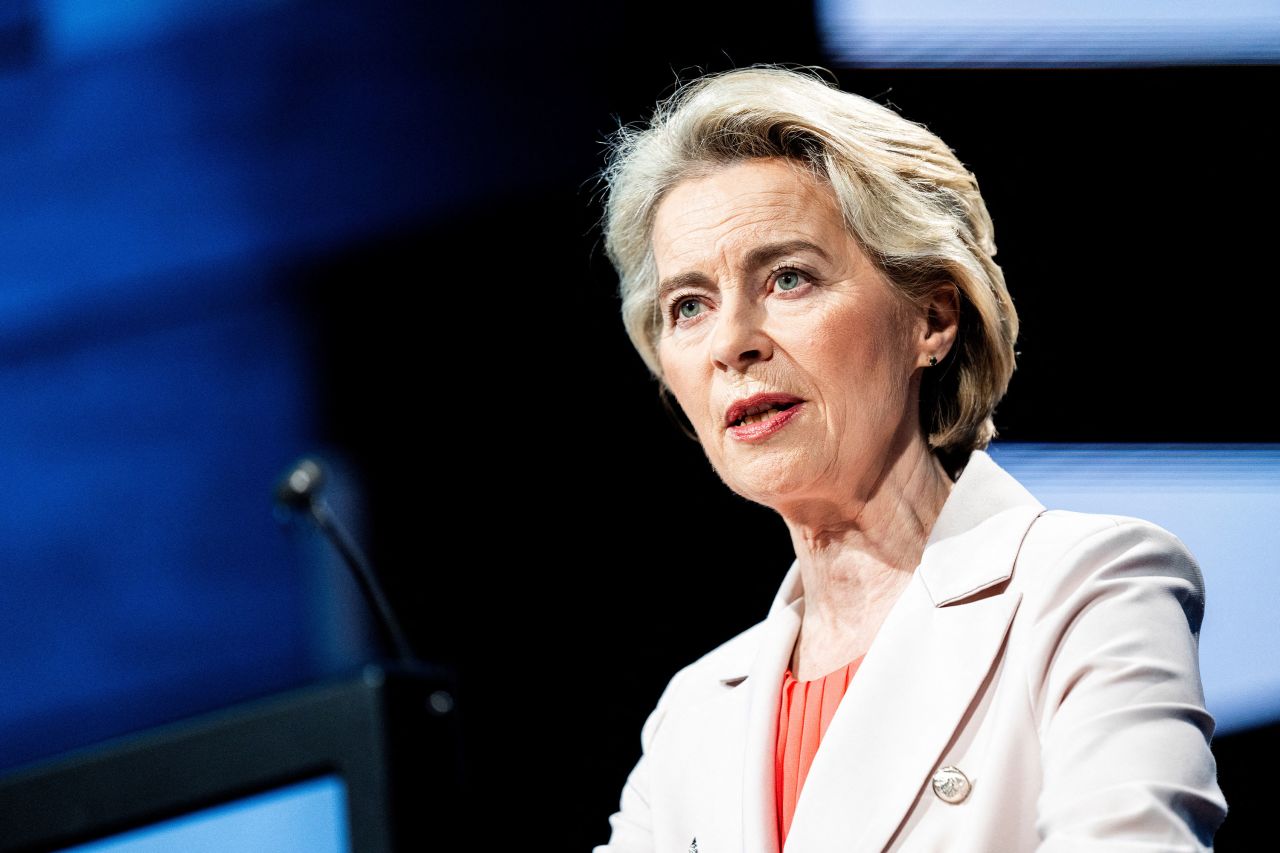
European Commission President Ursula von der Leyen speaks during the Copenhagen Democracy Summit, in Copenhagen, Denmark, on May 14.
The European Commission President is seeking a second term. Some might argue she was lucky to have a first.
In 2019, Ursula von der Leyen was not the lead candidate for the European People’s Party, the largest political group in the European Parliament, which has the final say on appointing the president of the commission. She was only nominated for the job after the leaders of the EU member states overruled the EPP, ignoring their choice for the job, Manfred Weber.
It was controversial at the time, as it is conventionally the European political parties who put forward their choice to be approved by the leaders. Critics of von der Leyen have said that since taking office she has worked more directly with member states than the European institutions, effectively making her a more political figure than some feel the commission’s leader has the right to be.
Controversy could surround von der Leyen again this year. She has risked alienating the center-left S&D party – the EPP’s partner in the parliament’s so-called “grand coalition – by hinting that she would be willing to work more closely with the hard-right conservative ECR grouping.
That will be on the minds of von der Leyen and her supporters as the results come in – especially if it transpires the ECR is making the gains predicted ahead of the elections.
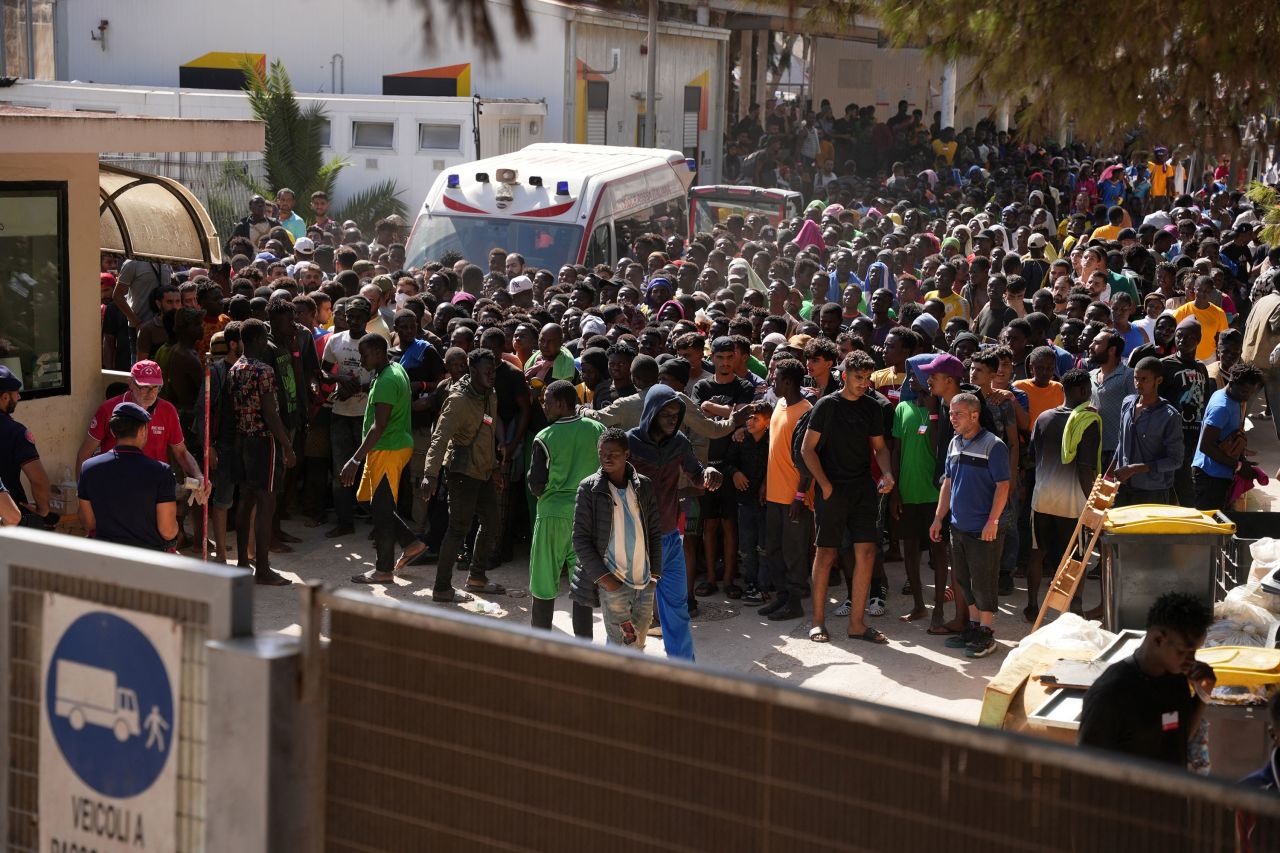
Migrants wait to receive registration papers from the Red Cross on the Italian island of Lampedusa on September 17.
Since this election is in effect 27 individual national elections, some issues are in play in some countries but not in others.
Broadly speaking, immigration, climate change, security and support for Ukraine are issues that matter across the bloc.
While irregular migration figures are lower than they were during the 2015-2016 refugee crisis, it is still a sensitive issue across the EU, as some countries bear a disproportionate share of the burden while others are loath to do their part.
Slowing the effects of climate change and making Europe greener has been a priority for a long time. However, some countries now balk at the cost of cutting fossil fuel emissions.
The EU is largely united in its support for Ukraine, but that too could be affected if populists like France’s Marine Le Pen are elected to lead national governments in subsequent elections.
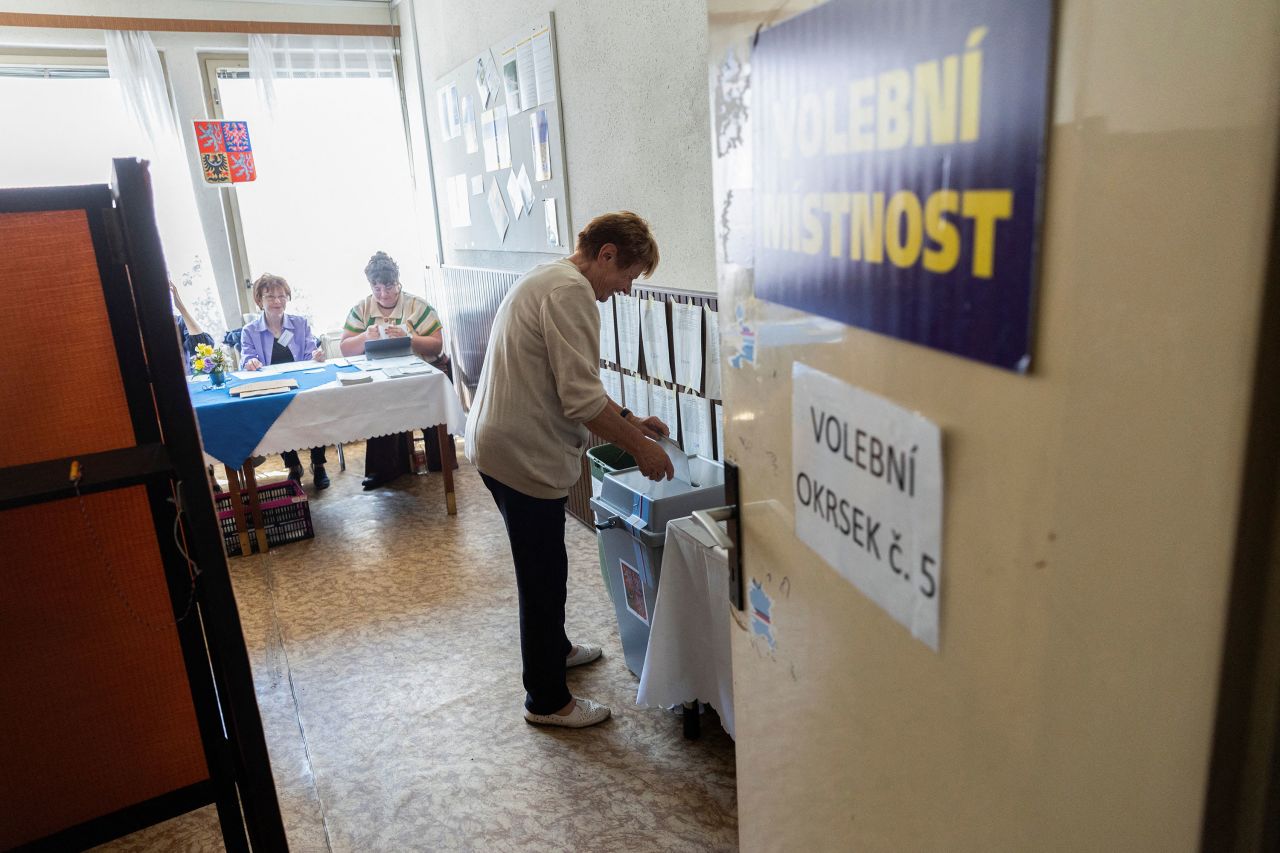
A woman votes at a polling station during the European parliamentary elections in Studena, Czech Republic, on June 7.
The elections are held over four days every five years in June. This year, they took place from Thursday to Sunday.
They are held over multiple days because, despite being elections to an EU institution, they are still arranged and managed as national ballots by each of the EU’s 27 member states.
Because the elections are managed at a national level, they are not all carried out in the same exact way. However, they must all employ a proportional representation system –where the number of lawmakers elected to the parliament directly correlates to the percentage of people who voted for them.
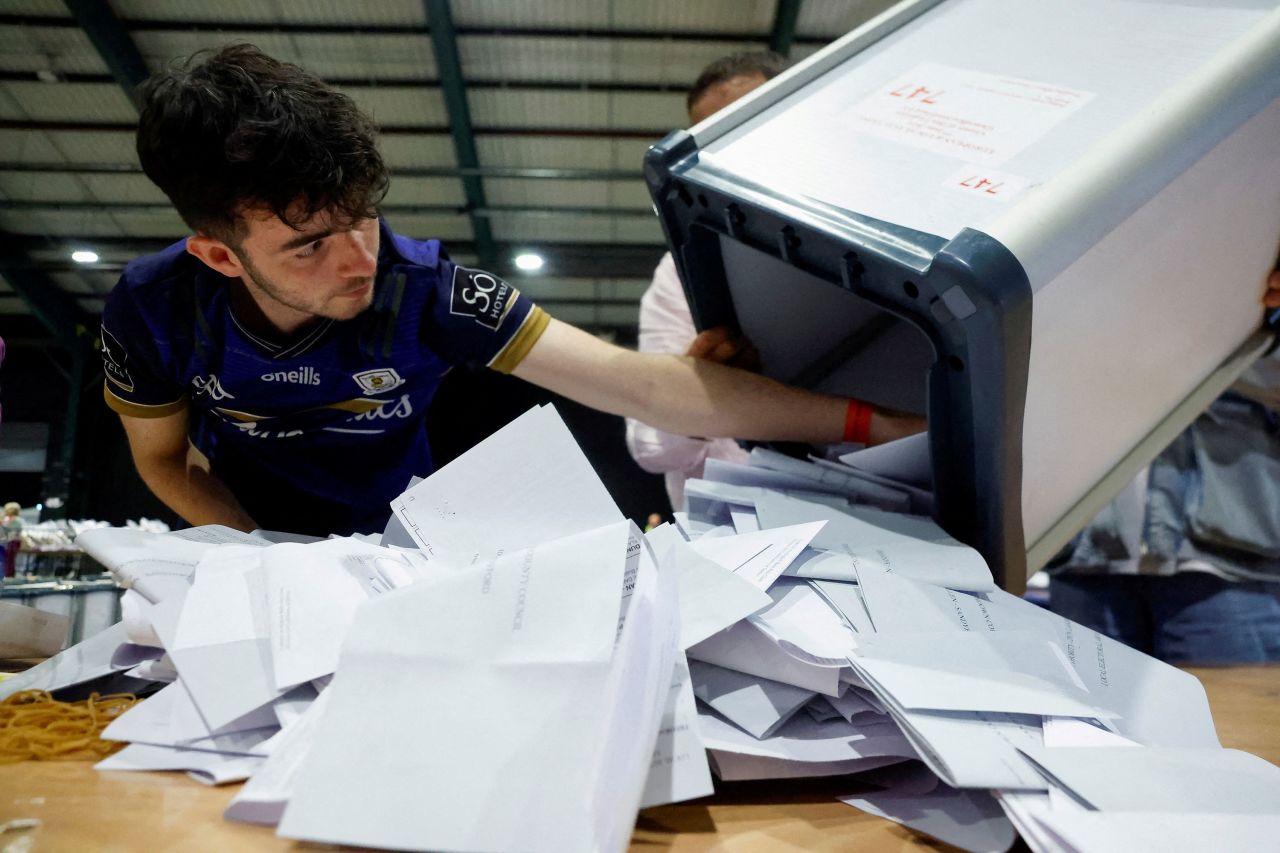
Ballot boxes are opened at a counting center in Dublin on June 8.
Once all the votes have been counted, each national political party will be assigned a number of members of European Parliament (MEPs) relative to their vote share. It is up to the member states to determine how this is assigned.
Once they have been appointed to the parliament, MEPs can then join a European political party, which allows them to sit in a group in the parliament. These parties and groupings are multinational and based on a loose set of shared beliefs. The bigger the grouping, the more influence it has in parliament.
Results will start to come in later this evening, but full results will not be known until at least Monday.
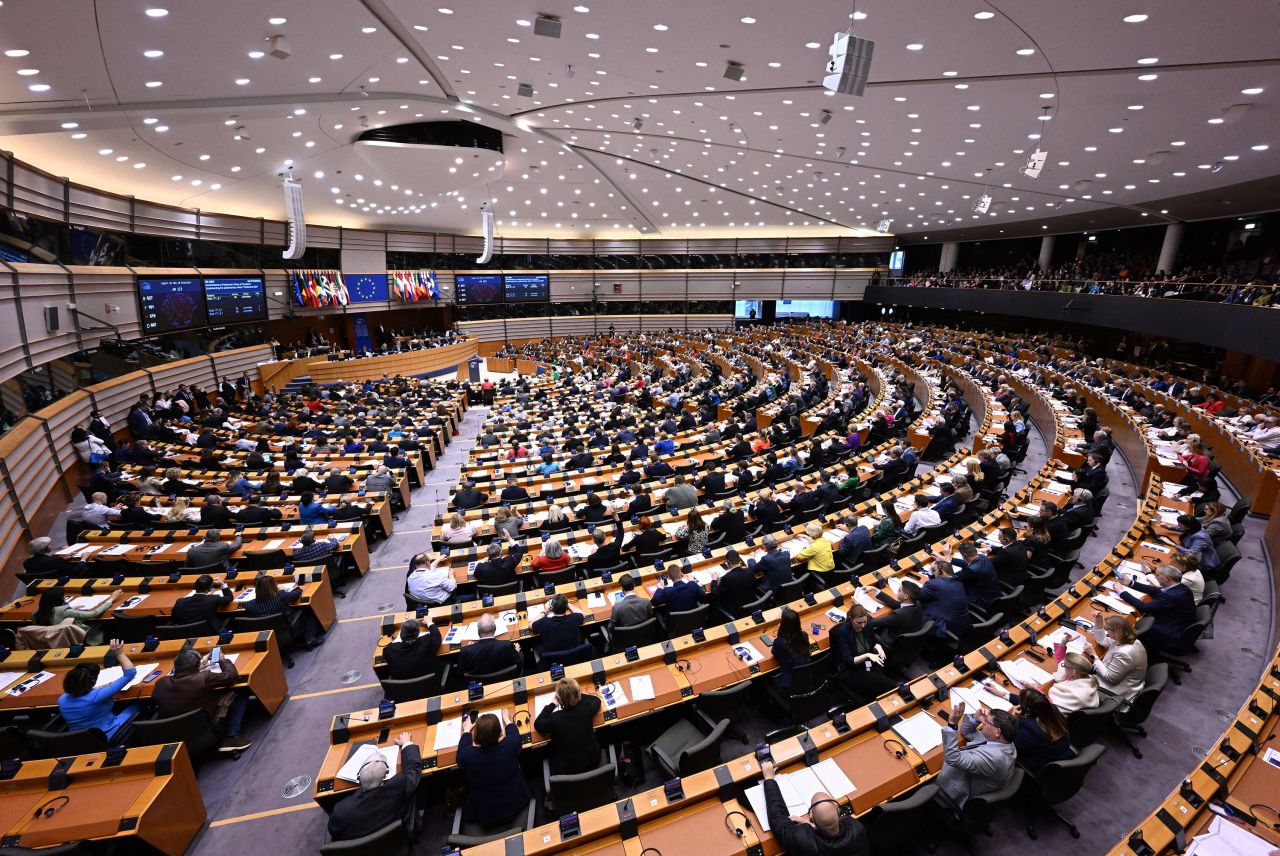
Members of European Parliament attend a plenary session in Brussels on April 10.
The European Parliament is the legislative branch of the European Union and one of the bloc’s three main institutions, along with the European Commission, which is the executive branch, and the European Council, which is made up of ministers from the governments of the 27 member states.
The parliament sits primarily in Brussels, Belgium, but moves roughly once a month to Strasbourg, France.
It is the only EU institution where representatives are directly elected, and MEPs pass laws which are applied all over the bloc. In order for any legislation to be implemented, both the council and parliament have to agree.
One of the parliament’s most crucial roles is approving the makeup of the commission, which is ultimately responsible for the political direction of the world’s largest trading bloc, and it has the final say on who is appointed as president of the commission. Currently the top job is filled by Germany’s Ursula von der Leyen, who is seeking a second term at the helm.
The parliament also has ultimate approval over the billions of euros allocated in the EU budget. It often has the final word on major policy issues such as the budget, trade and sanctions on foreign nationals.
The parliament can also put major international objectives in the deep freeze. For example, A comprehensive mutual investment agreement between the EU and China is effectively on hold while some MEPs are under sanctions from China. The parliament as a whole has refused to advance the agreement until the sanctions are lifted.
